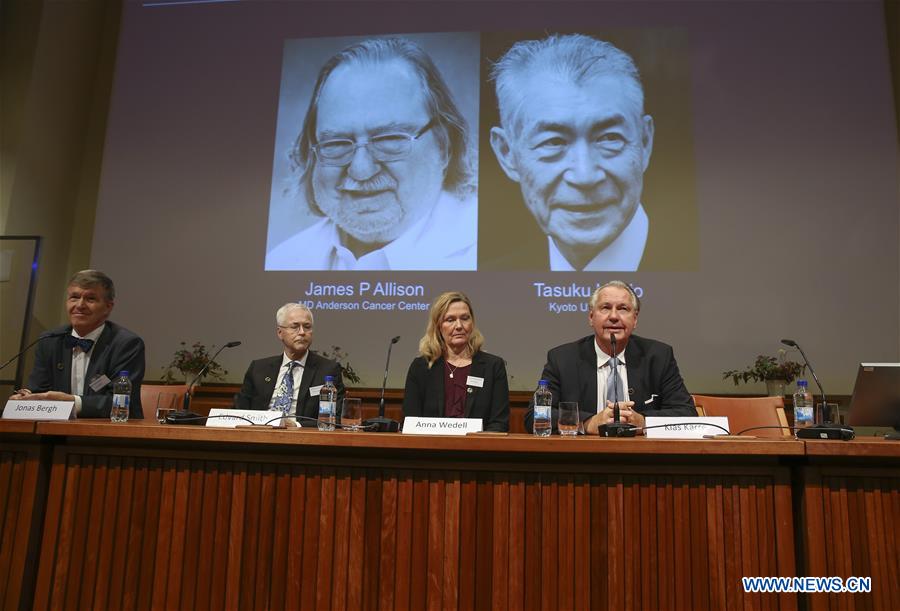
Members of the Nobel Committee for Physiology or Medicine announce two scientists James P. Allison (L, screen) of U.S. and Tasuku Honjo (R, screen) of Japan share 2018 Nobel Prize in Physiology or Medicine during a press conference at the Karolinska Institute in Stockholm, Sweden, on Oct. 1, 2018. The Nobel assembly at the Karolinska Institute has decided to award the 2018 physiology or medicine prize jointly to James P. Allison and Tasuku Honjo for their discovery of cancer therapy by inhibition of negative immune regulation. (Xinhua/Ye Pingfan)
STOCKHOLM, Oct. 1 (Xinhua) -- Two scientists shared the 2018 Nobel Prize in Physiology or Medicine, the Nobel Committee announced here on Monday.
The Nobel Assembly at the Karolinska Institute has decided to award the 2018 physiology or medicine prize jointly to James P. Allison and Tasuku Honjo "for their discovery of cancer therapy by inhibition of negative immune regulation."
This year's laureates showed how different strategies for inhibiting the brakes on the immune system can be used in the treatment of cancer. Their discoveries are a landmark in the fight against cancer, the committee said.
Edward Smith, member of the Nobel Committee, told Xinhua that the significance of this year's award pointed to a "new fashion" in cancer treatment. All previous treatments focused on tumor cells, but this one was focused on the immune system.
Cancer kills millions of people every year and is one of humanity's greatest health challenges. By stimulating the inherent ability of our immune system to attack tumor cells this year's Nobel Laureates have established an entirely new principle for cancer therapy, said a statement released by The Nobel Assembly.
Allison studied a known protein that functions as a brake on the immune system. He realized the potential of releasing the brake and thereby unleashing our immune cells to attack tumors. He then developed this concept into a brand new approach for treating patients.
In parallel, Honjo discovered a protein on immune cells and, after careful exploration of its function, eventually revealed that it also operates as a brake, but with a different mechanism of action. Therapies based on his discovery proved to be strikingly effective in the fight against cancer, according to the statement.
Allison and Honjo showed how different strategies for inhibiting the brakes on the immune system can be used in the treatment of cancer. The seminal discoveries by the two Laureates constitute a landmark in our fight against cancer, the statement added.
Thomas Perlmann, secretary-general of the Nobel Committee and the Nobel Assembly, told a press conference that Honjo "sounded extremely pleased" at the news.
This year's prize is 9 million Swedish krona (about 1 million U.S. dollars).











